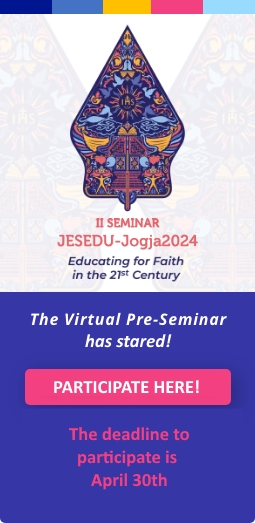The General Congregation 35 laid emphasis on the universal nature of the Society of Jesus by stating, “The new context of globalization requires us to act as a Universal Body with a Universal Mission, realizing at the same time, the radical diversity of our individual situations. It is as a worldwide community, and simultaneously, as a collective network of local communities – that we seek to serve ourselves as well as others across the world.” (GC 35, D 2, n. 20)
This recognition applies to the most important apostolate of the Society of Jesus, i.e. Jesuit Education, which has reached every corner of the world through various networks as reflected in the Educate Magis World Map of the Jesuit Schools Network.
Former Fr. General Adolfo Nicholas consistently advocated and promoted the dimension of ‘a Universal Body with a Universal Mission’. As a result, the International Colloquium on Jesuit Secondary Education (ICJSE) 2012, with over 450 delegates from Jesuit schools around the world, spelt out a vision statement to uphold the Jesuit commitment to global networking. Consequently, Educate Magis, an online community promoting Jesuit/Ignatian education, began to function as a worldwide network in realizing this vision of ICJSE.
Epitomizing the collaborative spirit of Jesuit educators from across the globe, they came together to engage in designing the course – An Introduction to Contemporary Jesuit Education. When Sunny Jacob, SJ, the moderator of the project, reached out to me, I was thrilled, as promoting Jesuit Education is my passion and mission, and the opportunity made me feel like I was actively contributing to a Universal Mission through a Universal Body. It was a truly enriching experience empowered through meaningful collaboration with Jesuit/Ignatian educators from different countries. Initially, perhaps the biggest challenge was that the contributors belonged to different time zones, thereby making it difficult to meet on Zoom. Moreover, it was difficult to design an online course by mmultiple experts with varying insights and perspectives. Hence, it was decided that a dedicated core group would be constituted, and its members would be responsible for sculpting a transformative curriculum while developing the course.
Later, the larger group could provide constructive feedback and suggestions to augment and streamline the course. The core group, comprising Hugo, Carol, Marianne, Paola, and I, met regularly and came up with ten units/chapters after much discussion and deliberations. On the basis of a common format, we individually designed two chapters each.
Once completed, we received feedback from Jose Mesa, Sunny Jacob, Eamonn, Gellert and other experts from Educate Magis. It was an enormous learning experience for us as we had to use up-to-date technology including Microsoft Teams.
Later, the courses were uploaded onto the Educate Magis Website. This process of ongoing discernment helped us to work closely as collaborators in a core team for a larger common mission of realizing the apostolic potential of our institutions. We attempted to renew the pedagogical dimension of our institutions to better respond to the changing context of our times, thus paving the way for a brighter, interconnected future.
It was heartening to be a part of this collaborative journey and to see the enabling approach of all members to ensure timely and successful completion of this mammoth endeavour.
Personally, this experience was enriching, as we worked in tandem, bringing diverse insights and perspectives to create courses for the benefit of larger communities transcending borders.
Networking and collaboration were essential across all levels, both global and local. At the South Asian Conference, the Jesuit Educational Association – South Asia (JEASA) functions as Jesuit Schools Network. In India, there are four zones consisting of four to five provinces, each with programs that aim to strengthen the Jesuit Global Network of education by taking on the challenges that fulfil the mission of Jesuit Education.
The Jamshedpur Jesuit Province, which comes under the central zone, has an Educational Resource Center (ERC) that co-ordinates 32 Jesuit English and vernacular medium schools. We also have the De Nobili Schools Network, with 12 schools under the leadership of a Jesuit Director. Six of these schools have Principals who are non-Christian lay men and women.
Hence, Jesuit school networking can take different forms in realizing the universal mission of Jesuit education. Thus, we have various networks worldwide, such as Fe y Alegria, JSN, and JRS, among others.
The following action points for networking with Jesuit Schools may support better student learning outcomes and characteristics of Jesuit education :
1. Becoming members of online communities like Educate Magis.
2. Participating in various online and offline conferences/ seminars can give us a platform that facilitates the exchange of ideas.
3. Organizing inter-Jesuit literary, cultural and sports competitions.
4. Teacher and student exchange programs.
5. Leveraging social media to drive engagement and affinity.
6. Networking among the alumni associations of schools.
7. Setting up collaborative partnerships with schools: pick a project, agree on common learning outcomes, plan activities, provide the teachers and students opportunities to interact and learn, gather evidence, analyze the findings and gain insightful data from similarities and differences.
8. Connecting with the right institutions and working towards nurturing and sustaining the relationship to promote Jesuit education.
Thus, as members of a global apostolate, Jesuits can effect positive change in a rapidly globalizing world. The Society of Jesus is called upon to make the world more humane, sustainable and just by lighting ‘a fire that kindles other fires’.
